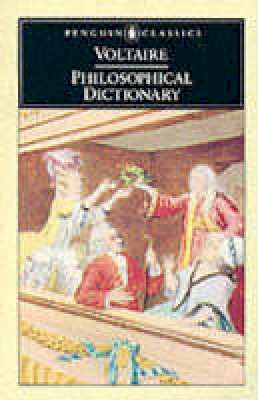11%OFF

Stock image for illustration purposes only - book cover, edition or condition may vary.
Philosophical Dictionary (Classics)
Francois Voltaire
€ 16.99
€ 15.19
FREE Delivery in Ireland
Description for Philosophical Dictionary (Classics)
Paperback. Presents a series of short, radical essays - alphabetically arranged - that form a brilliant and bitter analysis of the social and religious conventions that then dominated eighteenth-century French thought. It also considers such diverse subjects as Abraham and Atheism, Faith and Freedom of Thought, and, Miracles and Moses. Translator(s): Besterman, Theodore. Num Pages: 416 pages. BIC Classification: HP. Category: (G) General (US: Trade); (P) Professional & Vocational; (U) Tertiary Education (US: College). Dimension: 197 x 129 x 25. Weight in Grams: 320.
Voltaire's Philosophical Dictionary, first published in 1764, is a series of short, radical essays - alphabetically arranged - that form a brilliant and bitter analysis of the social and religious conventions that then dominated eighteenth-century French thought. One of the masterpieces of the Enlightenment, this enormously influential work of sardonic wit - more a collection of essays arranged alphabetically, than a conventional dictionary - considers such diverse subjects as Abraham and Atheism, Faith and Freedom of Thought, Miracles and Moses. Repeatedly condemned by civil and religious authorities, Voltaire's work argues passionately for the cause of reason and justice, and criticizes Christian theology and contemporary attitudes towards war and society - and claims, as he regards the world around him: 'common sense is not so common'.
Product Details
Publisher
Penguin Classics
Format
Paperback
Publication date
1984
Condition
New
Number of Pages
416
Place of Publication
London, United Kingdom
ISBN
9780140442571
SKU
V9780140442571
Shipping Time
Usually ships in 15 to 20 working days
Ref
99-15
About Francois Voltaire
Voltaire (1694 - 1778) became known in Paris for his satires and odes, and his frist tragedy Oedipe was performed with great success. He was imprisoned in the Bastille twice in his life and after the second time spent time in England (1726 - 29). He returned to France, but his political opinions meant he was never really safe there and he eventually settled in Geneva, where he remained until near the end of his life and wrote his most famous works, including Candide. Theodore Beterman is the founder and director of the Institut et Musee Voltaire, and author of the standard biography on Voltaire.
Reviews for Philosophical Dictionary (Classics)
